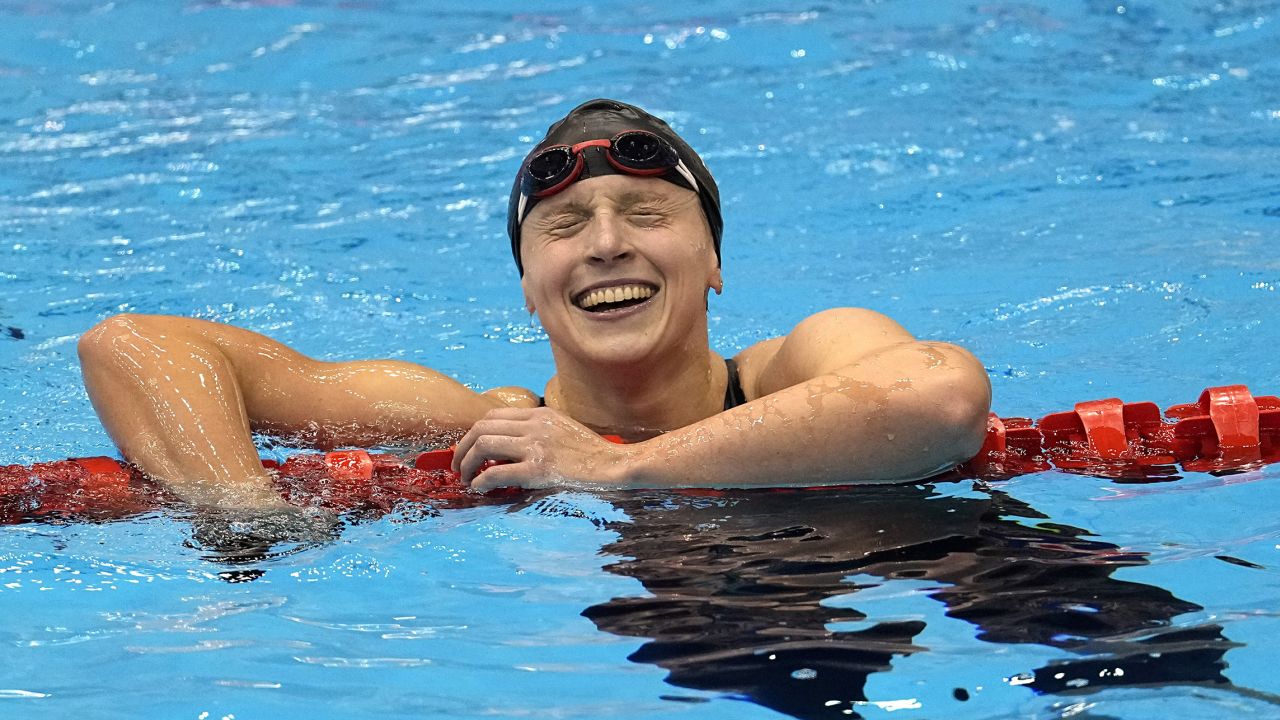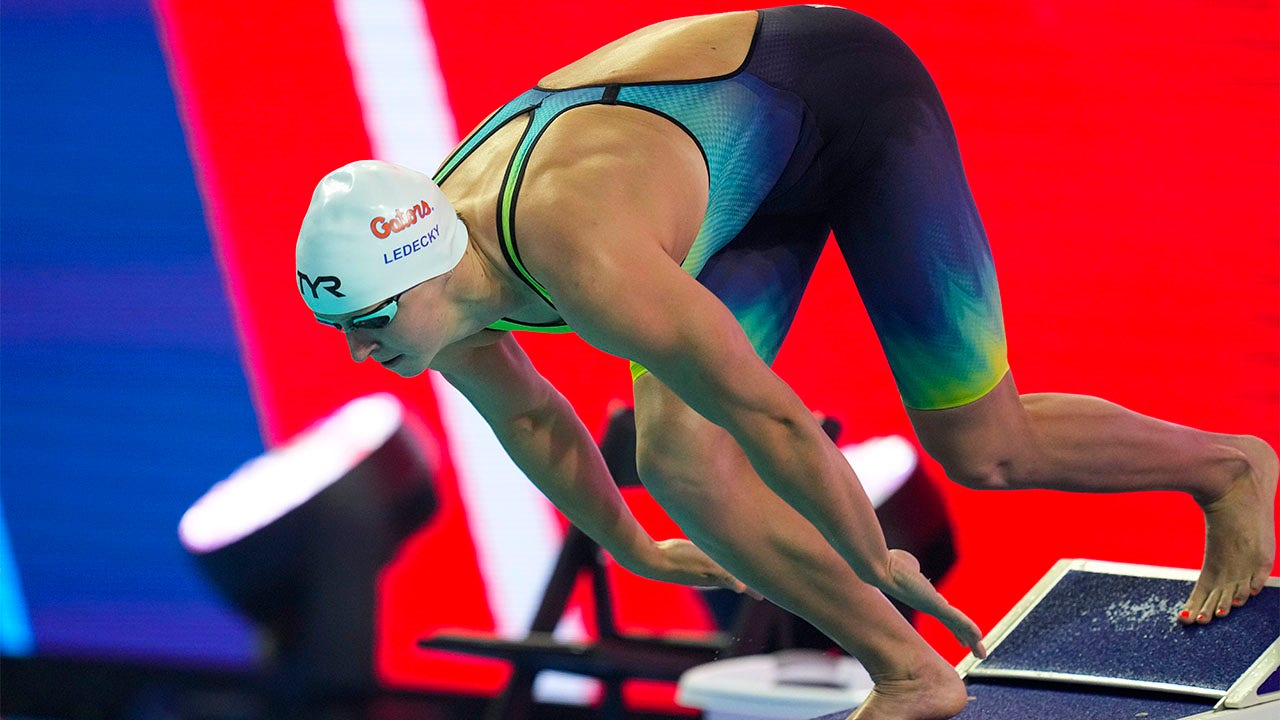There’s been a lot of buzz around Katie Ledecky lately, and one question seems to be on everyone's mind: Is Katie Ledecky trans? Let’s dive into this topic with an open mind and a whole lot of clarity. The world of sports has seen some incredible athletes, but Katie Ledecky stands out as a powerhouse in the pool. With her dominance in swimming, it’s no surprise people are curious about her background and identity.
Let’s start by setting the record straight. Katie Ledecky is one of the most celebrated swimmers in history, racking up Olympic gold medals and breaking records that seemed impossible to crack. Her achievements have made her a household name, and naturally, people want to know more about her personal life. But before we jump into the details, it’s important to approach this topic with respect and understanding.
As we explore whether Katie Ledecky identifies as transgender, we’ll look at her biography, achievements, and any public statements she’s made about her identity. This isn’t just about clearing up confusion—it’s about celebrating an athlete who has inspired millions around the globe. So grab your goggles, and let’s get swimming through the facts!
Table of Contents
- Katie Ledecky's Biography
- Is Katie Ledecky Trans? Unpacking the Question
- Katie Ledecky's Swimming Achievements
- What Has Katie Ledecky Said About Gender Identity?
- How the Media Has Covered This Topic
- Supporting Athletes Who Break Barriers
- The Debate Around Gender in Sports
- Common Misconceptions About Trans Athletes
- Final Thoughts on Katie Ledecky and Identity
- What You Can Do to Support Inclusivity in Sports
Katie Ledecky's Biography
Before we dive into the question of whether Katie Ledecky is trans, let’s take a moment to appreciate who she is as an athlete and a person. Katie Gene Ledecky was born on March 17, 1997, in Washington, D.C. She grew up in Bethesda, Maryland, where her love for swimming began at a young age.
Here’s a quick rundown of her early life:
- Birthplace: Washington, D.C.
- Family Background: Katie comes from a family with a strong athletic tradition. Her dad, David Ledecky, played football at Yale, and her mom, Mary Gen Ledecky, was a swimmer in high school.
- Education: Katie attended Stone Ridge School of the Sacred Heart, a private Catholic school in Bethesda, Maryland, before heading to Stanford University to further her swimming career.
Now, let’s take a closer look at her journey in the pool. Katie started competitive swimming at the age of six and quickly rose through the ranks. By the time she was a teenager, she was already making waves in the international swimming scene. Her dedication and talent have made her a role model for aspiring athletes everywhere.
Katie Ledecky's Early Career
Her breakthrough moment came at the 2012 London Olympics, where she won her first gold medal in the 800-meter freestyle. At just 15 years old, she became the youngest American female swimmer to win an individual gold medal since 1972. This was just the beginning of a remarkable career that would see her break records and inspire countless fans.
Is Katie Ledecky Trans? Unpacking the Question
Alright, let’s tackle the big question: Is Katie Ledecky trans? The short answer is no. Katie Ledecky has not publicly identified as transgender. She has been open about her identity as a cisgender woman, meaning her gender identity aligns with her biological sex at birth.
However, it’s important to approach this topic with sensitivity. The question of whether someone is transgender is deeply personal, and it’s not something that should be speculated about without clear evidence or statements from the individual themselves. Katie has never made any public declarations about being transgender, and her career has been defined by her achievements in the pool rather than her gender identity.
That being said, the conversation around gender in sports is evolving, and it’s crucial to create a space where all athletes feel supported and respected, regardless of their gender identity.
Why Does This Question Keep Coming Up?
There are a few reasons why this question might keep popping up. First, Katie’s dominance in the pool has led some people to question whether her success is due to factors beyond her control, such as her physical attributes. While it’s true that Katie has a unique combination of talent, training, and physiology, this doesn’t make her any less deserving of her achievements.
Second, the visibility of transgender athletes in sports has increased in recent years, leading to more discussions about gender identity and fairness in competition. While Katie herself is not trans, the broader conversation about gender in sports is worth exploring, and we’ll dive deeper into that later in the article.
Katie Ledecky's Swimming Achievements
Now that we’ve cleared up the question of whether Katie Ledecky is trans, let’s focus on what really matters: her incredible achievements in the world of swimming. Katie has set the bar incredibly high for herself and others, and her accomplishments speak volumes about her dedication and talent.
Here are just a few of her most notable achievements:
- Olympic Medals: Katie has won 7 Olympic gold medals and 3 silver medals, making her one of the most decorated female swimmers in history.
- World Championships: She has taken home 15 gold medals, 2 silver medals, and 1 bronze medal at the FINA World Championships.
- World Records: Katie holds multiple world records, including the 400m, 800m, and 1500m freestyle events.
- Stanford Legacy: During her time at Stanford, she continued to break records and inspire her teammates, earning multiple NCAA titles.
These achievements are a testament to her hard work and passion for the sport. But beyond the medals and records, Katie has become a symbol of perseverance and excellence. Her commitment to pushing boundaries and breaking barriers has inspired countless young athletes around the world.
What Makes Katie Ledecky So Dominant?
Katie’s success can be attributed to a combination of factors. First, she has a natural talent for swimming, with a powerful stroke and incredible endurance. Second, her training regimen is second to none, and she works tirelessly to improve her technique and stamina. Finally, her mental toughness and focus have allowed her to perform at her best even under pressure.
But it’s not just about physical ability. Katie’s humility and dedication to her craft make her a role model both in and out of the pool. She’s proof that with hard work and determination, anything is possible.
What Has Katie Ledecky Said About Gender Identity?
While Katie Ledecky hasn’t publicly identified as transgender, she has been vocal about her support for inclusivity in sports. In interviews and public appearances, she has emphasized the importance of creating a welcoming environment for all athletes, regardless of their background or identity.
Here are a few key points from her statements:
- Equality in Sports: Katie believes that every athlete deserves the opportunity to compete on a level playing field, regardless of gender, race, or socioeconomic status.
- Support for Trans Athletes: While she hasn’t specifically addressed the topic of transgender athletes, her advocacy for inclusivity suggests that she supports creating a more welcoming space for all athletes.
- Focus on Performance: Katie has emphasized that her focus is on her performance in the pool, rather than on external factors like gender identity or media attention.
It’s worth noting that athletes often face a lot of scrutiny about their personal lives, and it’s important to respect their privacy. Katie has chosen to keep her personal life relatively private, focusing instead on her career and her passion for swimming.
How the Media Has Covered This Topic
The media has played a significant role in shaping the narrative around Katie Ledecky’s identity. Some outlets have speculated about whether she is transgender, while others have focused on her achievements and her role as a role model. It’s important to approach these stories with a critical eye and rely on credible sources for information.
Here’s a breakdown of how the media has covered this topic:
- Positive Coverage: Many outlets have praised Katie for her achievements and her advocacy for inclusivity in sports.
- Negative Coverage: Unfortunately, some articles have speculated about her gender identity without any evidence, which can be harmful and misleading.
- Fact-Checking: It’s always a good idea to fact-check information before sharing it, especially when it comes to sensitive topics like gender identity.
As consumers of media, we have a responsibility to seek out credible sources and avoid spreading misinformation. By doing so, we can help create a more respectful and informed conversation about gender in sports.
Supporting Athletes Who Break Barriers
Regardless of whether Katie Ledecky is trans, it’s important to recognize the incredible work she’s done to break barriers in the world of sports. Her achievements have inspired countless young athletes, and her advocacy for inclusivity has made the sport more welcoming for everyone.
Here are a few ways you can support athletes who are breaking barriers:
- Follow Their Stories: Stay informed about the athletes who are making waves in their respective sports, and celebrate their achievements.
- Advocate for Inclusivity: Use your voice to promote inclusivity in sports and beyond, and support policies that create a fair and welcoming environment for all athletes.
- Respect Privacy: Remember that athletes are people too, and they deserve the right to keep their personal lives private unless they choose to share them publicly.
By supporting athletes who are breaking barriers, we can help create a world where everyone has the opportunity to succeed, regardless of their background or identity.
The Debate Around Gender in Sports
The conversation around gender in sports is complex and multifaceted. On one hand, there’s a growing movement to create more inclusive spaces for transgender and non-binary athletes. On the other hand, some people argue that allowing trans athletes to compete in certain categories could give them an unfair advantage.
Here’s a closer look at the debate:
- Inclusivity vs. Fairness: Advocates for inclusivity argue that all athletes should have the opportunity to compete in a category that aligns with their gender identity. Critics, however, worry that this could lead to unfair advantages in certain sports.
- Scientific Evidence: There’s ongoing research into the impact of testosterone levels and other physiological factors on athletic performance. While some studies suggest that trans women may have certain advantages in strength and speed, others argue that these advantages diminish over time with hormone therapy.
- Policy Changes: Many sports organizations are revisiting their policies on gender inclusion, with some adopting more flexible guidelines and others maintaining stricter criteria.
It’s a delicate balance, and there’s no easy answer. What’s clear, however, is that the conversation is evolving, and it’s important to approach it with an open mind and a commitment to fairness and respect.
Common Misconceptions About Trans Athletes
There are a lot of misconceptions about trans athletes, and it’s important to address them in order to create a more informed and supportive environment. Here are a few common myths and the truth behind them:
- Myth: Trans athletes have an unfair advantage. Truth: While some trans athletes may have certain physical advantages, many undergo hormone therapy and other treatments that level the playing field.
- Myth: Allowing trans athletes to compete undermines women’s sports. Truth: Inclusivity doesn’t have to


